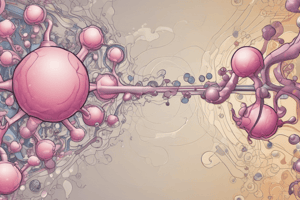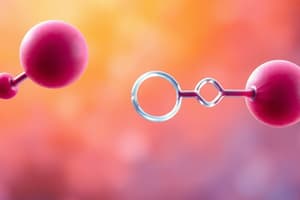Podcast
Questions and Answers
What is the primary function of hormones in the body?
What is the primary function of hormones in the body?
Which of the following hormones is classified as a steroid?
Which of the following hormones is classified as a steroid?
Which chemical structure is characteristic of steroid hormones?
Which chemical structure is characteristic of steroid hormones?
What type of hormones does the term 'androgens' refer to?
What type of hormones does the term 'androgens' refer to?
Signup and view all the answers
Which steroid hormone is primarily involved in the regulation of fluid and electrolyte balance?
Which steroid hormone is primarily involved in the regulation of fluid and electrolyte balance?
Signup and view all the answers
What is the number of carbons in the chemical structure of Cholestane?
What is the number of carbons in the chemical structure of Cholestane?
Signup and view all the answers
Which group of hormones includes progestins?
Which group of hormones includes progestins?
Signup and view all the answers
What is the main role of corticosteroids in the body?
What is the main role of corticosteroids in the body?
Signup and view all the answers
What is a primary therapeutic use of estrogens in postmenopausal women?
What is a primary therapeutic use of estrogens in postmenopausal women?
Signup and view all the answers
Which of the following is a side effect associated with the use of estrogens?
Which of the following is a side effect associated with the use of estrogens?
Signup and view all the answers
Tamoxifen acts as which type of drug in breast tissue?
Tamoxifen acts as which type of drug in breast tissue?
Signup and view all the answers
What distinguishes Selective Estrogen Receptor Modulators (SERMs) from other estrogenic drugs?
What distinguishes Selective Estrogen Receptor Modulators (SERMs) from other estrogenic drugs?
Signup and view all the answers
Which drug is classified as an antiestrogen and is used as an ovulation stimulant?
Which drug is classified as an antiestrogen and is used as an ovulation stimulant?
Signup and view all the answers
What is the mechanism of action of aromatase inhibitors?
What is the mechanism of action of aromatase inhibitors?
Signup and view all the answers
Which of the following is NOT a major side effect of estrogen usage?
Which of the following is NOT a major side effect of estrogen usage?
Signup and view all the answers
Which of the following statements about toremifene is accurate?
Which of the following statements about toremifene is accurate?
Signup and view all the answers
Which estrogen exhibits the greatest activity among estradiol, estrone, and estriol?
Which estrogen exhibits the greatest activity among estradiol, estrone, and estriol?
Signup and view all the answers
What structural feature do all natural estrogens share?
What structural feature do all natural estrogens share?
Signup and view all the answers
Which modification enhances the oral activity of estrogens?
Which modification enhances the oral activity of estrogens?
Signup and view all the answers
Which of the following is a prodrug that is metabolized to ethinyl estradiol?
Which of the following is a prodrug that is metabolized to ethinyl estradiol?
Signup and view all the answers
What is the main reason for the rapid degradation of estradiol when administered orally?
What is the main reason for the rapid degradation of estradiol when administered orally?
Signup and view all the answers
What is the primary role of estrogens in the female body?
What is the primary role of estrogens in the female body?
Signup and view all the answers
Which estrogen is known to be 15 to 20 times more orally active than estradiol?
Which estrogen is known to be 15 to 20 times more orally active than estradiol?
Signup and view all the answers
Which mechanism is utilized to enhance the metabolic stability of orally active estrogens?
Which mechanism is utilized to enhance the metabolic stability of orally active estrogens?
Signup and view all the answers
Which structural class includes compounds with no angular 19-methyl group?
Which structural class includes compounds with no angular 19-methyl group?
Signup and view all the answers
What modification is made to 17α-hydroxyprogesterone to form Medroxyprogesterone Acetate?
What modification is made to 17α-hydroxyprogesterone to form Medroxyprogesterone Acetate?
Signup and view all the answers
What effect does the 17α-acetoxy group have on progesterone derivatives?
What effect does the 17α-acetoxy group have on progesterone derivatives?
Signup and view all the answers
Which compound is primarily used in the treatment of breast and endometrial carcinomas?
Which compound is primarily used in the treatment of breast and endometrial carcinomas?
Signup and view all the answers
Which structural modification facilitates the formation of esters that are highly lipid soluble in 17α-hydroxyprogesterone derivatives?
Which structural modification facilitates the formation of esters that are highly lipid soluble in 17α-hydroxyprogesterone derivatives?
Signup and view all the answers
What is the primary advantage of using 19-norprogesterone derivatives over standard progesterone derivatives?
What is the primary advantage of using 19-norprogesterone derivatives over standard progesterone derivatives?
Signup and view all the answers
Ethisterone is categorized under which of the following structural classes?
Ethisterone is categorized under which of the following structural classes?
Signup and view all the answers
Which characteristic does the 17α-hydroxyprogesterone-17-caproate exhibit?
Which characteristic does the 17α-hydroxyprogesterone-17-caproate exhibit?
Signup and view all the answers
What is the primary effect of 19-nortestosterone derivatives as compared to testosterone?
What is the primary effect of 19-nortestosterone derivatives as compared to testosterone?
Signup and view all the answers
Which compound blocks oxidation to the less active 17-one and is orally active?
Which compound blocks oxidation to the less active 17-one and is orally active?
Signup and view all the answers
What is a characteristic feature of Norgestrel and Levonorgestrel compared to Norethindrone?
What is a characteristic feature of Norgestrel and Levonorgestrel compared to Norethindrone?
Signup and view all the answers
Which statement about Norgestimate is true?
Which statement about Norgestimate is true?
Signup and view all the answers
What is the role of Norelgestromin in contraceptive methods?
What is the role of Norelgestromin in contraceptive methods?
Signup and view all the answers
Ethynodiol Diacetate requires which metabolic processes to produce its active form?
Ethynodiol Diacetate requires which metabolic processes to produce its active form?
Signup and view all the answers
How is Levonorgestrel primarily administered in addition to orally?
How is Levonorgestrel primarily administered in addition to orally?
Signup and view all the answers
Desogestrel is characterized by which of the following?
Desogestrel is characterized by which of the following?
Signup and view all the answers
What is a key structural feature of Raloxifene that distinguishes it from other SERMs?
What is a key structural feature of Raloxifene that distinguishes it from other SERMs?
Signup and view all the answers
Which properties does Raloxifene exhibit on bone and cardiovascular systems?
Which properties does Raloxifene exhibit on bone and cardiovascular systems?
Signup and view all the answers
What is Fulvestrant's primary mechanism of action as a drug?
What is Fulvestrant's primary mechanism of action as a drug?
Signup and view all the answers
What specific effect does Fulvestrant have on tamoxifen-resistant breast cancers?
What specific effect does Fulvestrant have on tamoxifen-resistant breast cancers?
Signup and view all the answers
What are the non-steroidal aromatase inhibitors mentioned?
What are the non-steroidal aromatase inhibitors mentioned?
Signup and view all the answers
What is unique about Exemestane's mechanism of inhibition?
What is unique about Exemestane's mechanism of inhibition?
Signup and view all the answers
Which of the following agents is the first steroidal aromatase inhibitor approved for breast cancer treatment?
Which of the following agents is the first steroidal aromatase inhibitor approved for breast cancer treatment?
Signup and view all the answers
What consequence is associated with the lack of agonist action on endometrial tissue by Raloxifene?
What consequence is associated with the lack of agonist action on endometrial tissue by Raloxifene?
Signup and view all the answers
Study Notes
Steroidal Hormones
- Steroidal hormones are chemical messengers synthesized in one organ system and distributed to other systems.
- They regulate functions such as growth, metabolism, nutrient absorption, and fluid and electrolyte balance.
- They are classified into different groups according to chemical structure and origin.
- Steroids have a specific chemical skeleton: cyclopentanoperhydrophenanthrene.
- Steroidal hormones include sex hormones, adrenocorticoids, chorionic hormones, thyroid hormones, parathyroid hormones, and pancreatic hormones.
Classification of Hormones
- Pituitary hormones are categorized into anterior and posterior pituitary hormones:
- Anterior pituitary hormones include polypeptides (ACTH, LPH, PRL, GH) and glycoproteins (FSH, LH).
- Posterior pituitary hormones include polypeptides (oxytocin and vasopressin).
- Hypothalamic hormones are polypeptides that act as releasing factors for pituitary hormones.
- Gonad hormones (sex hormones) are steroids, subdivided into male (androgens, e.g., testosterone) and female (estrogens and progestins).
- Adrenocortical hormones are steroids, including mineralocorticoids, glucocorticoids, and androgens.
- Chorionic hormones are polypeptides (e.g., human chorionic gonadotropin (HCG), human chorionic mammotropin).
- Thyroid hormones are iodoamino acids (e.g., T3, T4) and polypeptides (e.g., calcitonin).
- Parathyroid hormones are polypeptides (e.g., parathormone).
- Pancreatic hormones are polypeptides (e.g., insulin, glucagon).
Steroids' Chemical Skeleton
- The basic skeleton of steroids is cyclopentanoperhydrophenanthrene, a fused ring structure.
- The skeleton consists of three six-membered rings and one five-membered ring.
Angular Methyl Groups
- Steroid structures often contain one or more angular methyl groups (CH3) attached to specific carbons in the ring system.
- These groups are key structural elements influencing the properties of the steroid.
Side Chain at 17th Position
- Many steroid hormones have a side chain attached at the C17 position.
- The side chain's structure and composition are specific to different hormone types.
IUPAC Names of Hormones
- Specific hormones are associated with specific numbers of carbons, which define their IUPAC ring names (e.g., Estrane, Androstane, Pregnane, Cholane, Cholestane).
Steroid Hormone Action
- Steroid hormones bind to intracellular receptors, forming complexes that regulate gene expression and protein synthesis.
- The steroid-receptor complexes bind to DNA and interact with transcription factors, initiating the transcription of mRNA.
- Elevated mRNA levels result in increased protein synthesis in the endoplasmic reticulum.
- These proteins (enzymes, receptors, secreted factors) lead to steroid hormonal response, regulating cell function, growth, and differentiation.
Sex Hormones
- Sex steroids are involved in primary and secondary sex characteristics.
- Natural sex steroids are produced by the gonads (ovaries or testes), adrenal glands, or by conversion from other sex steroids in tissues like the liver or fat.
Female Sex Hormones (Progestins)
- Progestins are grouped into Estrogens and Progestins.
- The primary function of female sex hormones is reproductive system development and control of menstruation and pregnancy.
- They also control secondary sex characteristics.
- Progesterone is the key endogenous steroid hormone that acts at progesterone receptors (PRs).
- Progesterone is produced in the ovaries, testes, and adrenal glands.
- Common progestin uses are birth control, rectification of hormonal deficiency (HRT), and management of dysfunctional uterine bleeding, dysmenorrhea, and endometriosis.
Metabolism of Progesterone
- Progesterone has weak oral activity due to rapid liver metabolism, into inactive metabolites.
- These metabolites are excreted in the urine.
- A crucial urinary metabolite specific to progesterone metabolism is 5β-pregnane-3α,20α-diol and its conjugates.
Structural Classes of Progestins
- Progestins are compounds that share similar biological activity patterns to progesterone
- Progesterone derivatives (e.g., 17α-hydroxyprogesterone derivatives).
- 19-Norprogesterone (Norpregnanes) Derivatives.
- Testosterone (androstane) derivatives.
- 19-Nortestosterone (estrane) derivatives.
- Spironolactone derivative (Drospirenone).
Progesterone Derivatives
- These compounds are characterized by insertion of a hydroxyl group at the 17a-position, which promotes the formation of lipid-soluble esters.
- 17a-ester hinders reduction to the 20-ol, promoting oral use.
- This structure allows for oral use.
- Examples include 17a-acetoxyprogesterone, and 17α-hydroxyprogesterone-17-caproate.
Medroxyprogesterone Acetate
- A 6-methyl group is introduced into the 17-hydroxyprogesterone structure.
- This reduces the rate of reduction in the 4-ene-3-one system and that of the 20-one, thus promoting oral use.
Megestrol Acetate
- A double bond is introduced between carbon positions 6 and 7, increasing progestin activity.
19-Norprogesterone Derivatives
- These progestin derivatives lack the angular 19-methyl group on the progesterone molecule.
- Examples include nomegestrol acetate.
Testosterone Derivatives
- Ethisterone is a 17a-ethynyl derivative of testosterone.
- This derivative is effective as an oral progestin.
19-Nortestosterone Derivatives
- Norethindrone is a 17a-ethinyl-19-nortestosterone derivative.
- Norethindrone and norethindrone acetate are orally active as progestins.
Ethynodiol Diacetate
- A prodrug of norethindrone that uses hydrolysis of esters and oxidation of the C3 alcohol.
- This process yields the active progestin.
Norgestrel and Levonorgestrel
- These have an ethyl group instead of a methyl group at C13.
- They show progestational activity and reduced androgenic effects.
- Norgestrel is a racemic mixture, while levonorgestrel is the active levorotatory enantiomer.
Norgestimate
- 19-nortestosterone, a 3-oxime prodrug, readily metabolized to 17-deacetylnorgestimate.
- This is an orally active progestin used with estrogens.
Norelgestromin
- The progestin component in the contraceptive patch (Ortho-Evra).
Desogestrel
- Is an active prodrug, rapidly metabolized to etonogestrel.
Gestodene
- Progestin component in Gynera oral contraceptive.
Antiprogestins
- Antiprogestins are substances that compete with progesterone for its receptor and keep it from activating the receptor.
- Mifepristone is a PR antagonist used to induce abortion.
Selective Estrogen Receptor Modulators
- SERMs are drugs that only act in certain tissues.
- Tamoxifen is an ER antagonist in breast tissue but an agonist in endometrium, liver, bone, and cardiovascular systems.
Clomiphene Citrate
- An ovulation stimulant that is also a SERM.
- Clomiphene is a mixture of two geometric isomers.
Tamoxifen
- A triphenylethylene SERM used to treat breast carcinoma.
Toremifene
- Structurally similar to tamoxifen, with a chloroethyl group instead of an ethyl one.
Raloxifene
- A benzothiophene derivative.
- Has antagonist activity in the endometrium and breast tissue.
- Has agonist activity on bone and cardiovascular system.
Fulvestrant
- A pure antagonist structurally based on estradiol structure, and an alkyl chain at position 7.
- This compound does not have agonist activity.
Aromatase Inhibitors
- Aromatase inhibitors block aromatase, an enzyme, thereby reducing estrogen levels.
- Steroidal: Testolactone and Exemestane
- Non-steroidal: Aminoglutethimide, Anastrozole, Letrozole
- Important to differentiate the mechanism of actions of these drugs and their use as treatment.
- Exemestane is an example of one of these drugs.
Studying That Suits You
Use AI to generate personalized quizzes and flashcards to suit your learning preferences.
Related Documents
Description
Test your knowledge on the functions and classifications of hormones in the human body. This quiz covers key concepts about steroid hormones, their structures, and roles in regulating various bodily functions. Ideal for students studying biology, biochemistry, or related fields.





